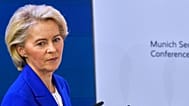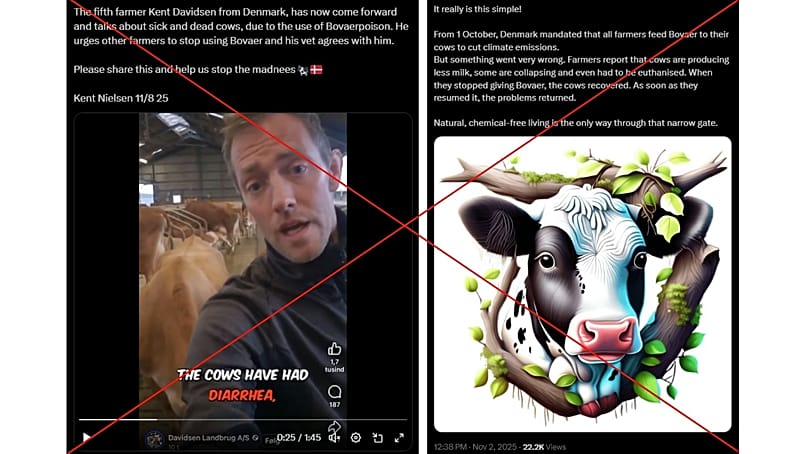Misinformation and controversy surrounding the methane-reducing Bovaer feed additive hit the UK last year, and has now travelled over to Denmark.
Cows in Denmark are falling seriously ill and even dying due to the use of the feed additive Bovaer, a series of viral social media posts claims.
 ADVERTISEMENT
ADVERTISEMENT
 ADVERTISEMENT
ADVERTISEMENT
The posts share videos and supposed testimonies of dairy farmers who have given their cows Bovaer, which is used to reduce methane emissions, in which they refer to the feed additive as "poison".
They say that cows fed with Bovaer are collapsing, developing diarrhoea, producing less milk, becoming infertile and even dying, adding that humans' food supply is also being poisoned as a result.
Some allege that stopping the use of Bovaer has led to fewer cases of paralysis and diarrhoea, healthier animals and better milk yield, and are calling for a global boycott of the substance.
While some online claims may appear hyperbolic and border on conspiracy, they are being published amid a wave of concerns among Danish dairy farmers about the health of their cattle — concerns that authorities in the country are now investigating.
Bovaer is designed to reduce methane emissions from cows by suppressing an enzyme in their digestive system that is responsible for producing methane. It is said to cut emissions by up to 30% in dairy cows and possibly even more in beef cattle.
The agricultural sector is the biggest methane emitter in Europe and accounts for about 56% of the EU's methane emissions, according to the European Environment Agency. The digestion process (known as enteric fermentation) in cattle alone accounted for 67% of the sector's methane emissions in the EU in 2020.
Bovaer is safe for cows and humans if used properly
Food safety authorities and independent experts across the world assure that Bovaer is safe for cows, and doesn't make milk or meat from animals that have taken it unsafe for humans to consume.
The European Food Safety Authority (EFSA) published a scientific opinion in 2021, in which it said that Bovaer was effective and safe for dairy cows "at the maximum recommended level" and was of no concern for consumer safety or the environment.
It noted that its active substance, 3‐nitrooxypropanol (3-NOP), can irritate the skin and may be hazardous if inhaled, and it couldn't say for sure that it was safe for other animals apart from cows.
The UK's Food Standards Agency (FSA) more recently published a notice in December 2024, explaining that cows metabolise Bovaer, so it doesn't pass to their milk or meat.
It also said that 3-NOP had passed rigorous safety assessments and that Bovaer posed no safety concerns when used at the approved dose.
"It does not cause cancer (it is not carcinogenic or genotoxic) and poses no safety concerns to consumers, animals or the environment," the FSA said. "More than 58 studies on potential risks were evaluated and it was concluded that the additive is safe at twice the recommended dose."
The FSA made the announcement amid a wave of controversy online, after certain British supermarkets teamed up with the Danish-Swedish company Arla Foods for a 90-day trial of Bovaer.
Some UK social media users at the time raised concerns about Bovaer's safety and poured milk down the sink in protest, while others spread rumours that US businessman Bill Gates was involved in its development and part of the "conspiracy".
Independent animal nutrition experts vouch for the feed additive's safety, stressing that it must be used and administered correctly, and that the scare surrounding it may stem from a misinterpretation of safety warnings on the product's label.
"Certain people state it causes fertility issues in males, skin and eye irritation, not suitable for direct human consumption, cancer, et cetera," Jan Dijkstra, associate professor in ruminant nutrition at Wageningen University in the Netherlands, told The Cube, Euronews' fact-checking team.
"However, warnings on Bovaer's safety label are as such: factory staff should wear protective clothing when diluting, dosing, or adding pure Bovaer to cattle feed," he added, noting that the final product is indeed safe.
"Farmers don't use pure Bovaer," Dijkstra said. "Safety warnings are completely normal for an industrial additive in concentrated powder form."
Bovaer's manufacturer, the Swiss-Dutch company DSM-Firmenich, assures that the additive has been proven safe by more than 15 years of research and is a vital player in reducing global methane emissions.
"Bovaer has undergone extensive scientific evaluation, with well over a decade of research and no evidence of adverse health effects in cows," a company spokesperson said. "There are no reported issues in any of the countries where Bovaer is used — beyond what is allegedly reported in Denmark."
The spokesperson added that the additive had been used successfully in the first nine months of the year in Denmark by 400 dairy farmers, without ever being identified as a contributor to health issues in cows.
Denmark seriously looking into cases of ill cows
Copenhagen mandated the use of methane-reducing feed at the beginning of 2025 to make its agriculture more climate-friendly, assuring Bovaer's safety.
However, following reports by some 350 out of around 1,600 Danish farmers of cattle illness and death, certain bodies such as the Danish Food and Veterinary Administration, SEGES Innovation and Aarhus University have begun taking reports of changes in the health and behaviour of dairy cows seriously.
DSM-Firmenich also told The Cube that the company is working with the investigation to work out what is going on, and that animal welfare is a "top priority".
They want to see whether Bovaer feeding could be contributing to digestive or production changes, or if other factors like diet composition explain why certain farms are reporting challenges but not others.
Nevertheless, researchers at Aarhus University have previously said that, during their extensive research on the feed additive, they have never observed the symptoms or even the death of cows that some reports have expressed.
Other experts have repeatedly reached the same conclusion.
"Scientific studies indeed sometimes, but not always, show reduced feed intake and milk production; this effect seems to occur more frequently at higher doses of 3-NOP," Dijkstra told The Cube. "It is unclear at the moment if Bovaer is really causing the problem in Denmark. For example, at the same time of introducing Bovaer, half of the farmers reporting problems changed diet composition, like opening the new batch of maize silage harvested a few weeks earlier."
"So it is simply unclear if Bovaer is causing problems, or if something else happening at the same time is causing it," he added. "We need to take this seriously and investigate, but we also need to stay away from any odd, untrue claims as to infertility and other symptoms mentioned before."
Dijkstra noted that it was strange that, in light of the reports of cow death and declining health coming from some Danish dairy farmers, none of the dozens of trials reported in scientific literature came back with any serious issues for cows' health.
"Some studies report minor reduced feed intake and milk production, but none report issues like 'downer' cows, mastitis, or death," he said.
He pointed to an extensive trial published in the Journal of Dairy Science, which he was involved in, which found that cows taking Bovaer maintained the same feed intake and even showed an increase in milk production.
"Bovaer is used by hundreds of farmers in the Netherlands and Belgium, and other European countries; some farmers have been using it already for several years," Dijkstra said. "No problems have been reported by these farmers, so the Danish situation as to cow health at present is rather unique."
"We cannot explain it from science, and it is not in line with other practical experiences of farmers elsewhere, nor with scientific experiments," he said.
















